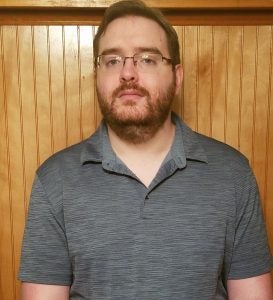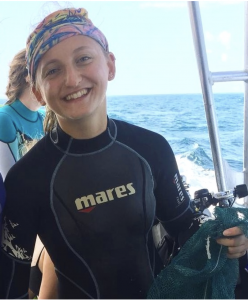Dr. Arin Nelson, postdoctoral researcher with Dr. Baylor Fox-Kemper (Brown) & Dr. Lew Rothstein (URI)

Greetings! I am constructing a forecast system for Narragansett Bay utilizing computer models and real-world observations developed by my peers in the RI C-AIM community.
My academic interests lay in the patterns of motions of things. These interests led me to get a Bachelor’s degree in physics from Michigan Technological University, where I studied topics such as nanotechnology, acoustic levitation, and high-energy particle astrophysics. I found I preferred topics related to Earth, so for my Ph.D. I studied atmospheric and oceanic science at the University of Colorado, where my thesis focused on global ocean heat content variability on timescales from months to hundreds of thousands of years. Afterwards I was a postdoctoral fellow at the University of Michigan, where I quantified the skill of current global-scale computer models in predicting ocean tides.
My experiences with both observations and computer models of the ocean led me to my current project, constructing a forecast system for Narragansett Bay based on computer models developed thus far and improving them by assimilating observations to nudge the models in the right direction. A primary goal of this project is to understand and forecast harmful algal blooms which lead to fish kills and beach closures around the state.
Feel free to contact me at dr.adnelson@gmail.com if you wish to talk about anything related to my work, both past and present. Until next time!
Annie Innes-Gold, graduate student with Dr. Austin Humphries (URI)

I’m a master’s student in the Biology and Environmental Sciences (BES) program, and just defended my thesis studying food web and fisheries interactions in Narragansett Bay. I grew up in Northampton, MA and attended Vassar College, NY, graduating in 2018 with a BA in Biology and minor in Anthropology. In 2019, I began the BES program focusing in Ecology and Ecosystem Sciences. I worked closely with my advisor, Dr. Austin Humphries, as well as Maggie Heinichen and Dr. Jeremy Collie to create an ecosystem model representing the Narragansett Bay food web, which was recently published in Marine Ecology Progress Series. For my thesis research, I linked this food web model to an agent-based model of recreational fisher behavior, creating a social-ecological model, and ran different fishing scenarios to study the responses of both the food web and the recreational fishers.
While at URI, I attended an agent-based modeling workshop at the National Center for Socio-Environmental Synthesis (Annapolis, MD) and presented at the American Fisheries Society Winter Meeting (Boston, MA) and the Ecopath 35 Years Conference (St. Petersburg, FL), where I won best poster. I also got the opportunity to assist on some other projects, including partnering with the RI Department of Environmental Management to perform habitat survey dives, and mentoring an undergraduate on a study of striped sea robin diet.
In January, I am starting a Marine Biology PhD program at the University of Hawai’i at Mānoa, where I will study the grazing patterns of herbivorous fishes on coral reefs.

 RI NSF EPSCoR is supported in part by the U.S. National Science Foundation under EPSCoR Cooperative Agreements #OIA-2433276 and in part by the RI Commerce Corporation via the Science and Technology Advisory Committee [STAC]. Any opinions, findings, conclusions, or recommendations expressed in this material are those of the author(s) and do not necessarily reflect the views of the U.S. National Science Foundation, the RI Commerce Corporation, STAC, our partners or our collaborators.
RI NSF EPSCoR is supported in part by the U.S. National Science Foundation under EPSCoR Cooperative Agreements #OIA-2433276 and in part by the RI Commerce Corporation via the Science and Technology Advisory Committee [STAC]. Any opinions, findings, conclusions, or recommendations expressed in this material are those of the author(s) and do not necessarily reflect the views of the U.S. National Science Foundation, the RI Commerce Corporation, STAC, our partners or our collaborators.